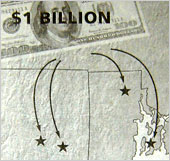Mass. Slots Watch
 With April 5 set as the date for the Massachusetts House to debate a slots bill passed by the Senate last fall, both sides are advocating their positions with increasing vigor. The New England HBPA and the track employees’ union took out a quarter-page ad on the Boston Globe editorial page this morning (click the image to view the ad in full) that iterates the argument that gambling money leaving the Commonwealth now could be recaptured, while House speaker Sal DiMasi has officially come out as a slots opponent. The Boston Herald reports that the speaker’s “top lieutenants” are pressuring individual lawmakers to vote no on the bill: “The fix is in. It’s just like the old days,” said one Beacon Hill insider. “The word has gone out. He doesn’t want it.”
With April 5 set as the date for the Massachusetts House to debate a slots bill passed by the Senate last fall, both sides are advocating their positions with increasing vigor. The New England HBPA and the track employees’ union took out a quarter-page ad on the Boston Globe editorial page this morning (click the image to view the ad in full) that iterates the argument that gambling money leaving the Commonwealth now could be recaptured, while House speaker Sal DiMasi has officially come out as a slots opponent. The Boston Herald reports that the speaker’s “top lieutenants” are pressuring individual lawmakers to vote no on the bill: “The fix is in. It’s just like the old days,” said one Beacon Hill insider. “The word has gone out. He doesn’t want it.”
Speaking to the Greater Boston Chamber of Commerce today, DiMasis said, “I look at what has been going on in the racing industry, and it seems to be a dying industry,” and predicted that the slots bill would be defeated in the House. “I don’t think the support’s there that people think there is.”
That DiMasi has broken the silence he’s maintained on the slots issue for the last 18 months with such strong statements this week has deflated slots supporters who thought there was a strong chance for the bill to pass this year:
Supporters estimate that 90 out of 160 legislators in the House may vote yes on the bill, which falls short of the 106 that’s needed to override governor Mitt Romney’s expected veto. But it’s likely overriding a veto won’t be a concern after April 5. If the influential speaker of the House predicts that a bill won’t pass, “you can pretty much well … bet on it not passing.”
More: Slots legislation archive
Mass. Slots Watch
More than 100 racetrack employees, horse owners, and local politicians rallied in front of the Massachusetts State House on Monday in support of a bill passed by the Senate last fall that allows up to 2,000 slot machines to be installed at each of the state’s four racetracks and which has languished in the House since. Legislators are meeting today to set a date “to formally debate” the bill, which was to have been voted on in March according to an agreement made last December. It’s now expected that the legislature will take action on April 5, a delay that’s angered some slots supporters.
More slots links: Suffolk Downs is now maintaining a news page with links to relevant articles from newspapers across the area.
Mass. Voters Back Slots
Massachusetts racetrack owners could get the slots they wish for this spring. The state Senate passed a bill allowing slots machines last fall, and a vote on the issue is due to come up in the House next week. Supporters claim a narrow majority in the House, with an estimated 86 of the 160 members ready to say yes to slots (although, it must be noted, that’s not enough to override governor Mitt Romney’s anticipated veto). Even Massachusetts voters are getting on the slots bandwagon. According to a Boston Globe poll:
The poll also showed that out-of-state travel (to casinos like Foxwoods and Mohegan Sun in Connecticut) for the purpose of gambling is quite real:
While things are looking good for those who favor expanded gaming, the outcome of the House vote — whenever it’s scheduled — is hardly certain. Anti-gambling state representative Dan Bosley “is rallying his troops” to stop the legislation, and House speaker Sal DiMasi’s attitude towards slots could be called noncommittal at best.
—
Racetrack employees are planning a rally at the State House next Monday to show support for the slots bill.
—
More on slots from the 3/16 edition of the Boston Globe: An opinion piece by Steve Poftak argues that the proposed $25 million licensing fee each track would have to pay to install slots is too low:
Poftak makes a lot of the same points that an article in the Boston Herald did a couple of weeks ago, which also took note of what happened in Pennsylvania, where slots licenses were granted for a $50 million fee:
That sounds like bad news for taxpayers, but is it for racing?
Copyright © 2000-2023 by Jessica Chapel. All rights reserved.